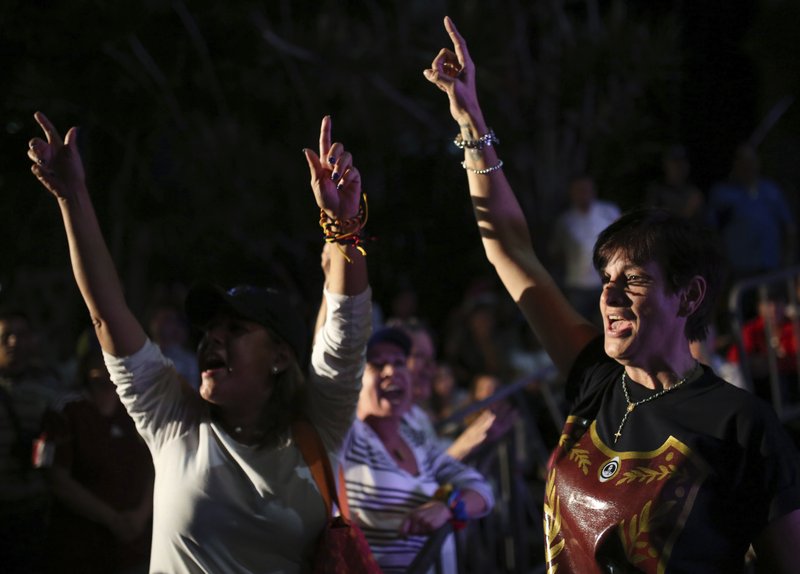CARACAS, Venezuela -- Venezuela's opposition on Monday called for a 24-hour nationwide strike to pressure President Nicolas Maduro to drop plans to rewrite the constitution, while the United States threatened "strong and swift economic actions" against his socialist administration if it ignores the will of voters in a referendum.
President Donald Trump joined other world leaders in urging Maduro to heed Sunday's symbolic plebiscite in which millions of voters rejected the plan to remake Venezuela's political system, which the opposition calls a power grab by the ruling party of a nation struggling with shortages, inflation and more than 100 days of anti-government protests.
The vote came two weeks before Venezuela's government will hold an election to select a constituent assembly to rewrite the constitution. Canada, Mexico, Brazil and the European Union have also come out against the effort.
"The United States will not stand by as Venezuela crumbles," Trump said in a statement. "If the Maduro regime imposes its Constituent Assembly on July 30, the United States will take strong and swift economic actions."
The U.S. president lauded voters in Sunday's referendum, saying "their strong and courageous actions continue to be ignored by a bad leader who dreams of becoming a dictator."
Despite the global and domestic calls for him to cancel the constituent assembly, Maduro vowed to press ahead with it.
"I won't be intimidated," Venezuela's president said in a speech at the presidential palace. Maduro's allies have called on the assembly to impose executive branch authority over the few remaining institutions outside the control of the ruling party.
More than 7 million people -- almost a quarter of the population -- voted to reject the plan to rewrite the constitution and consolidate the ruling party's power.
The opposition also said the country's National Assembly, which it controls, would name new members to the government-dominated Supreme Court, setting up a showdown with Maduro, whose party controls all but a few state institutions. Opposition parties also plan to sign a declaration calling for the formation of an alternative "government of national unity," a step toward total rejection of government authority.
Earlier in the day, opposition parties had floated the idea of escalating more than three months of street protests, which have left at least 93 people dead and 1,500 wounded. More than 500 protesters and government opponents have been jailed.
"Right now we have to escalate and deepen this street movement," National Assembly President Julio Borges told Venezuela radio station Exitos ahead of Monday's opposition announcement, which was delayed for hours as government opponents discussed their next steps behind closed doors.
Speaking at an afternoon news conference, opposition leader Freddy Guevara made little mention of more protests.
"We call on the whole country to launch a 24-hour national strike this Thursday, a massive, nonviolent protest, as a way to pressure the government and to prepare for the final steps, which will be next week, to confront this fraud ... and to restore constitutional order," he said. He didn't say what the final steps would be.
The opposition said 7,186,170 Venezuelans participated in Sunday's symbolic referendum rejecting Maduro's plans for the July 30 election of an assembly. Maduro's allies have called on the assembly to impose executive branch authority over the few remaining institutions outside the control of Venezuela's socialist ruling party.
Colombian President Juan Manuel Santos planned to discuss the Venezuelan crisis during a visit with President Raul Castro of Cuba, Venezuela's closest regional ally, Colombia's foreign minister said from Havana.
"It would be hard for two presidents to meet these days without discussing Venezuela, because of its importance and the concern the whole continent has about Venezuela," Foreign Minister Maria Angela Holguin said. "The situation in Venezuela will be part of the conversation with President Castro, seeing how we can come to a solution, that dialogue is re-established, that there are paths to a deal."
Colombia has dealt with rising tensions and a growing number of people crossing the border from Venezuela as the crisis has deepened.
Sunday's vote was a strong but not overwhelming showing that fell short of the 7.7 million votes garnered by the opposition in 2015 legislative elections and the 7.5 million votes that brought Maduro to power in 2013. Opposition leaders said that was because they were only able to set up 2,000 polling places in a symbolic exercise the government labeled as illegitimate.
A Section on 07/18/2017
